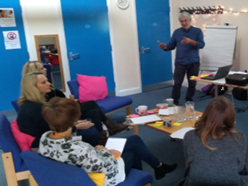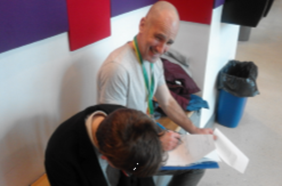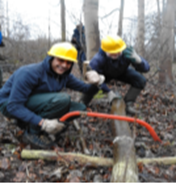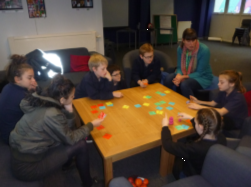The 8 optimum conditions for systems change
MAP have been working in three school communities in Norwich for the past five years. They’ve learned a lot about what works and what doesn’t when trying to collaborate with multiple stakeholders to influence systems to act earlier.
These are their reflections on the optimum conditions for system change, but they’ve found it’s not a simple ‘recipe for success’. It’s more like working in an ecosystem - there will be storms and droughts - but if we seek to create these conditions that will help the system to change and grow for the better.
1. Stability
It is impossible to work on influencing without stability. Five years of stable funding gave us the opportunity to have a long term commitment and use the resources flexibly. Charities can provide leadership on early action because they can work long term; working to a stable strategy. Schools and commissioners wanted to work with us when they knew we would be there for five years. The public sector is hampered by short term policy and silo budgets. Often all the public sector can do is respond to crisis: A&E targets, reducing children in care and school exclusions. Their culture is immersed in crisis.
2. Crisis
Crisis actually helped us engage with partners. Both our children’s services and mental health trust were in special measures; under huge pressure to improve and change. As a result they were more open to change, consider new ideas, and improve. This appetite helped open doors. A crisis needs a plan, a change of direction and allies. It meant we could be a part of that, setting shared goals.
3. Goals
To influence strategy and culture you need to be very clear about what you want to change. We explain our goals at all opportunities. Working to change culture in schools required them to sign up to our goals. When looking for partners this made it much easier to find the right allies. A theory of change is important. A simple goal that is central to the organisation and easy to communicate is essential for this to work. It is not simply a project goal but central to our mission as a charity.
4. Organisations not projects
Early action has to be at an organisational level. Investment is for the organisation, not an isolated project within it. MAP’s mission is to equip young people to be ready for adult life. We exist for Early Action. Therefore, when considering who to invest in, it is important to look at the whole organisation – what is their strategy, structure and values? Are they well run? Early action in our DNA.
Not all organisations see themselves as influencers. Being an influencer is a strategic decision for an organisation. A one-off project will not be effective. As an influencer we undertake campaigns, deliver training, take part in national research and talk at conferences.
We strongly encourage funders to support organisations rather than fund short term projects. Foundations usually have investment portfolios. They may move their investments if they want to improve their returns. Foundations should consider funding organisations in the same way; providing funding until they feel they aren’t getting the impact they want; an investment portfolio of organisations. This would lead to longer term and bigger impact.
Early action requires a type of organisation: one that has a local connection; a community they are engaged with and one that is big enough, with the right structure and skills, to be influential. There is a sweet spot: big enough but local enough. We need to be credible.
5. Credibility
Organisations can’t only do influencing. They need to have expertise in their area by delivering services. We have this credibility locally – known for providing excellent, well evaluated services. A good reputation is essential to be an influencer. Service delivery still needs funding as well as influencing work. They go hand in hand. We can develop evidence of success, train others, model behaviours all through the expertise of service delivery. This is why we are the Eastern Region Lead for the Centre for Youth Impact. It is only through our service delivery we engage with young people who are the biggest influencers of all.
6. Lived experience
We have learnt a vital lesson: young people are the biggest influencers. They bring their expertise through experience and are seen by the system as neutral, without vested interest. We didn’t focus on this anywhere near as much as we should have in the beginning. Now we promote young influencers as much as we can and are supporting the development of the Young Activist Network. Young people demand earlier action. It is our relationships with young people through our service delivery that has been one of our major assets.
7. Good Relationships
We had excellent existing relationships with young people and partners when we started this work. We understood their needs, goals, pressures. This helped us develop shared work. With trust in place we can achieve so much more. This became a focus of our work.
To further improve relationships we developed a new way of working: “systemic conversations”, with our fellow mental health providers. This work was published in a public health journal. When common purpose and trust is established change can happen. It led to the development of our Commission that made recommendations that have been adopted for the new model for mental health services in Norfolk. Our Commission was a mixture of professionals (head teacher, psychologist, psychiatrist, social worker, funding manager, chief executive) and young people, independently chaired by a Mental Health Tribunal Judge. We develop relationships by expressing our values.
8. Values
Our values are at the core of everything. They ensure consistency and focus. They are early action values. We are young person centred; we are led by their ideas. We value each individual; understanding their strengths. We work for social justice; tackling the causes not just the symptoms. We are professional; working to high standards and evidence. Organisations need values that lead them to early action in their delivery and lead them to take on influencing. Values can be shared and aligned with partners.
About MAP and Early Action in Norwich
MAP opened its doors in 1991 in Norwich as Norfolk’s first Youth Information, Advice and Counselling Centre, and has been growing ever since.
Since 2015 MAP have been funded by the Early Action Neighbourhood Fund for an ambitious programme of ‘Early Action’ services for young people in West Norwich. The West Norwich area has high levels of deprivation across a number of indices, significant risk factors for young people becoming NEET. Many young people in West Norwich do not feel able to access facilities and services based in central Norwich.
We’ve been working in three school communities
Our Early Action programme is based on-site in 3 schools in the area, and in the local community, to ensure our provision is easily accessible to young people. By giving young people access to the right support at the earliest moment we hope to help them improve their social and emotional wellbeing, leading to better attainment and less chance of becoming NEET. Hopefully this will also mean they are less likely to need acute services later.
We have offered a microcosm of MAP’s services directly to students within their schools. Counselling, family mediation, mentoring for students and social opportunities are all available alongside professional Advice relating to subjects ranging from sex, relationships, debt, future education and managing stress.
We’ve also been influencing systems
Our aim throughout has been to use the evidence of the demand for these interventions and the positive outcomes of them to influence and improve the services and funding available for early intervention work of this type in Norfolk.
We have helped to create systems change through professional collaborations, training and consultation. We formed the Early Action Network to bring together local professionals from within this community; to identify training needs, share good practice, collaborate to support children and families and to strengthen the voice of early intervention. We have trained teachers and pastoral staff and advised on policy changes within schools.
We want to improve the quality, quantity and accessibility of wellbeing support for young people in Norfolk. We have used our evidence and position to negotiate increased funding for early action in schools and have begun an ongoing collaboration with our local Mental Health NHS trust. We are using our evidence and experience to better ensure young peoples’ needs are represented whilst they undergo a full re-design of service.
We’ve managed to achieve a lot
Throughout this work we have been successful in:
Delivering significant wellbeing interventions for 1591 young people
Training 400 school and community professionals
Improving schools’ awareness of and policies for student mental health
Reducing demand for community mental health services
Reducing local waiting lists for students accessing therapeutic services
Increasing school’s investment in early intervention wellbeing interventions
Contributing our evidence and experience to our local NHS Mental Health Trust’s service redesign – ensuring young people are consulted and heard.
If you would like to learn more about our model, impact and learning on this project, please read our 2019 IMPACT Report or contact paulwebb@map.uk.net





